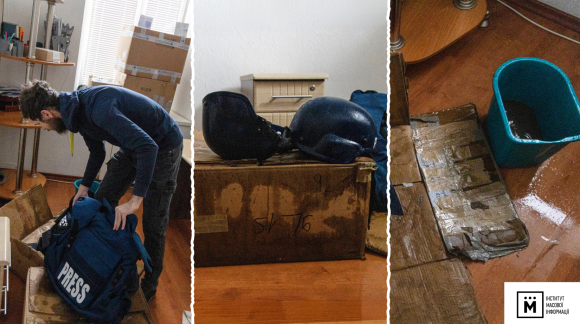The Ukrainian Veterans Foundation released a set of recommendations for journalists “Writing About Veterans”. The presentation of the recommendations took place on September 27 in Kyiv, Ukrinform reports.
Karina Doroshenko, deputy CEO of the Ukrainian Veterans Foundation, stressed that veterans are to be treated with respect and empathy, that a journalist should realize that they are not just some people for one to write an article about. The veteran must understand why the reporter wants to learn their story.
According to her, veterans are a very diverse group and the mass media should be aware of this and avoid excessive heroization so as not to create an image that may later disappoint. At the same time, it must be remembered that a military person left their civilian life behind and stood up to defend their country.
“It is important to learn some details about their combat experience, if possible. Even if a person is quite restrained, you can learn a lot of good episodes, there may be a lot of positive things in a veteran’s biography,” said Doroshenko.
At the same time, she added, there is no need to resort to pity. It should also be taken into account that nowadays a veteran is very likely to be a young person: about 39% of veterans are under 35.
Regarding female veterans, Doroshenko advised journalists to avoid stereotypes: when writing about a woman veteran, emphasize her expertise, not her looks, and do not ask why a woman joined the army (because this reinforces the stereotype that war is not a woman’s job and only special women who are not afraid of anything or are very strong physically are fit for it).
“Every woman who decides to take up arms wants to be on an equal footing and prove her competence above all, because she really is an expert at her job. One should focus on her strong suits as a professional in combat and not on her gender. For this a journalist should refrain from comparing her military achievements with those of men, as this reinforces the stereotypes. Say, if she blew up fewer tanks or destroyed fewer targets that must mean she is the weaker sex,” said Doroshenko.
The Ukrainian Veterans Foundation also advises not to ask a woman about her children: “Did you leave yout kids at home?”, “How are your kids?” etc. This only works to re-traumatize, such information should only be reported at the veteran’s own initiative, if she wants to talk about it. It is also necessary to avoid the stereotype that women join the army to find a good match and marry.
Furthermore, when working on a material about PTSD (post-traumatic stress disorder), a journalist should understand that this mental disorder does not only occur in veterans. Such materials should not feature footage of acts of aggression, where a veteran clutches at their hair desperately, breaks dishes, etc., because this creates an image of a veteran whom one should pity or beware of because his psyche is traumatized, Doroshenko noted.
“It is unnecessary to look for mental disorders and mental health issues in everyone. We recommend against making light of PTSD in general, against making any simplifications and generalizations in headlines, because this is a serious topic that concerns everyone. There is no need to give headlines like ‘All veterans suffer from PTSD,'” she noted.
The Ukrainian Veterans Foundation advises to focus not on the bad things, but on helping.
The Foundation remarks that disabled people need special attention from the media. Journalists must follow a simple rule: if the disability is visible, do not take pictures of the missing limbs without the permission of the report’s hero.
It is important to use the correct vocabulary – “veterans with disabilities”, because the person is what matters. Avoid the phrases “invalid”, “cripple”, “person with limited capabilities”, “person with special needs”.
“For example, the term ‘person with special needs’. What does ‘special needs’ mean? I have a special need for a cup of coffee in the morning. This does not mean that one should cram everyone into this category,” Doroshenko stressed.
Moreover, one should keep in mind that the war in our country has been going on since 2014 and some veterans are veterans twice. You shouldn’t write that the war started in 2022, because in this way veterans are divided into different groups.
It is also important to understand that not all details of a veteran’s biography can be reported on. A journalist needs to clarify this and ask permission from the hero of their story. One should not underplay nor exaggerate the veteran’s merits.
It is advisable not to overuse the stories of veterans, bloggers, people with a platform whom we see in all the news; you need to look for new stories.
“The responsibility for how people perceive and will perceive veterans lies with the media. Perception produces action. Therefore, every word, every video, every message that is said is not just words, it is something that will later turn into action on the part of other people across and beyond Ukraine,” concluded the Ukrainian Veterans Foundation CEO, Nataliya Kalmykova.

